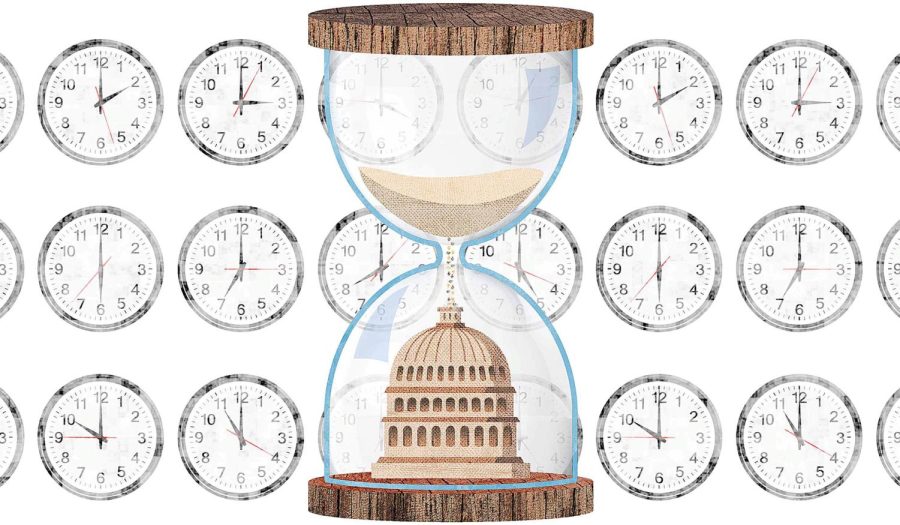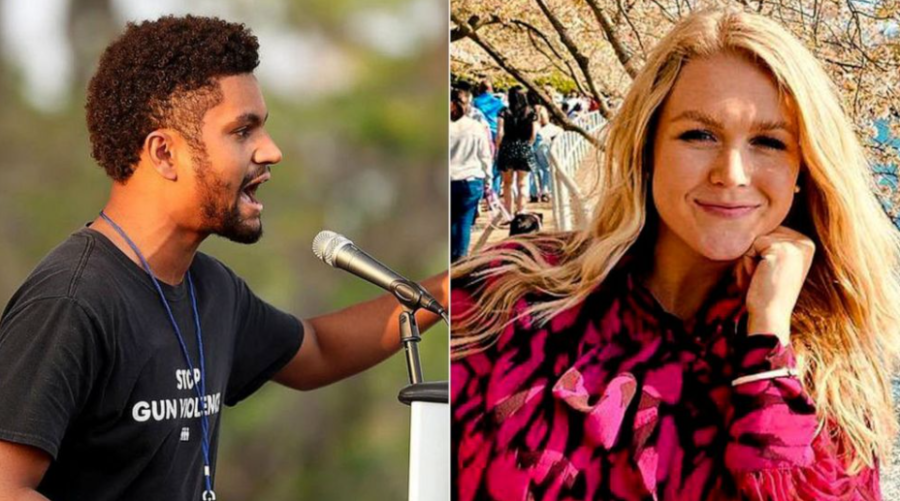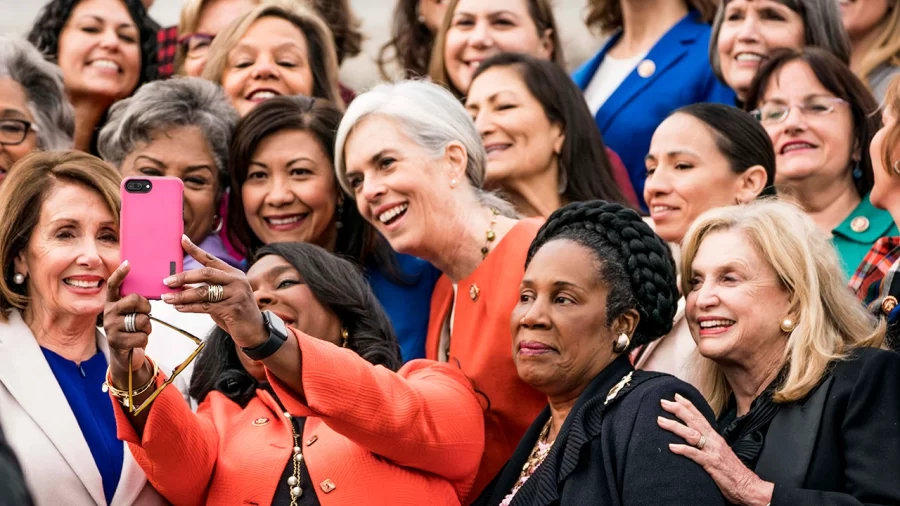Exploring The New Age of Politicians
May 31, 2022
With all the turmoil in politics occurring recently, it is important to look into who American citizens are electing and why. In order to see real change that benefits the most citizens, the right representatives and senators need to be elected. These three stories explain possible steps to take in order to see a more effective and representative legislative body.
Term limits need to be established to abolish career politicians
Courtesy of the Washington Times
Establishing term limits would work towards ending corruption within the legislature.
When you think of a politician, who comes to mind? Is it an older white male with a background in law or business? Have When you think of a politician, who comes to mind? Is it an older white male with a background in law or business? Have you seen this face on your television and in the news for years? Maybe even decades? What you do not typically see is your average, everyday, educated citizen being elected into office. This, in part, is due to the evolution of politics as a profession.
As politics has become more restricted to your common citizen, congressmen and women have begun to serve for extended periods of time, even decades. As a result, in recent years, the discussion of establishing term limits for Senators and Representatives has stirred up controversy.
In 1947, Congress passed the Twenty-Second Amendment, which limited a president to only serving two terms, in order to preserve the sanctity of the presidency. Other politicians, such as governors, mayors and school board members across the country have term limits, depending on the state. If these offices have term limits, why is the same standard not applied to Congress? The absence of term limits has allowed for the development of career politicians, many of whom erode the integrity of Congress.
While it is important that those who make up Congress have experience and are given the opportunity to enact change, those who serve for decades may actually forestall progress. Enacting term limits would promote an evergoing cycle of new politicians, which would allow new ideas to infiltrate the currently stalled Congress. Bipartisan fighting has plagued Congress for decades. Having new majority leaders and a new Speaker of the House would help break up this infighting and create a more positive environment within Congress.
Many critics believe that term limits would take away valuable and experienced members of Congress, and replace them with incapable politicians. However, term limits are often set to prevent burnout. Leading the United States is an emotionally and physically taxing job. This is why Presidents only serve two terms. Term limits would allow politicians to serve to the best of their abilities for a limited number of years in comparison to serving only adequately for a long period of time. Additionally, nobody is able to serve in the political arena for long before they become surrounded by a cloud of suspicion and scandal that affects the public view. Term limits may prevent this corruption and establish a new foundation of trust with the public.
The need to establish term limits derives from the bigger issue of career politicians. When the Founding Fathers established the three branches of government they believed those serving in said government would be regular folk ready to serve their civic duty before returning to everyday life. While many politicians strive to work their way up through the ranks, the true goal of anyone serving in public office should be to protect the liberty of every citizen. Term limits would prevent this sort of ambitious thinking and allow for those who truly strive to make a difference to become politicians.
Although it is true that citizens do elect those who serve in Congress, according to a Gallup Poll conducted in February 2022, 75% of the public disapproves of Congress. For the past decade, approval ratings have never broken 40% and have even dropped as low as 13%. This demonstrates how much Congress needs to change.
These so-called career politicians, while experienced, may no longer be qualified to serve the United States to their full potential. Establishing term limits would pave the way for new politicians-teachers, engineers, journalists and create a Congress capable of representing the citizens of the United States.
The new age of politicians brings brand new perpectives
Generation Z politicians, such as Maxwell Frost and Karoline Leavitt, can now run for office bringing fresh perspectives
The makeup of Congress is slowly but surely changing. Despite the older generations, called the Silent members, still making up for the majority of Congress, there is a slightly rising number of millennials and Generation Xers in the House of Representatives. However, more evolution is needed through electing people of mixed race ethnicity, backgrounds and education because Congress continues to fail to accurately represent the American population. There is still an underlying question as to whether or not Congress is making enough efforts to break away from the traditional views of its members.
The foreign share of members of Congress has gone up but has not surpassed any sort of historical high. Currently, immigrants only make up around 3% of legislators which include the 18 members of the House of Representatives Congress should be focusing on increasing this number because the percentage of immigrants remains significantly low when compared to the majority of the members. Despite the statistics, there are other factors to consider such as previous education and experience of these members which is a crucial factor in determining if Congress has really entered a new age full of opportunities for minorities of differing backgrounds rather than solely consisting of the traditional white Congressman.
Direct military experience used to widely apply to the majority of the House of Representatives and the Senate. However, far fewer people with such experience serve in the current Congress. 91 members currently are veterans which is the lowest number since World War II, according to the Congressional Research Service. This can be seen as a way to broaden the scope of politics and allow non-traditionally experienced people to have a shot in Congress.
The majority of Congress has a college degree, yet amatuer candidates all of a sudden are running?. This is ultimately the most prominent enhancement in current and future politics. Political scientists Sarah Treul and Rachel Porter of the University of North Carolina at Chapel Hill found that in both the Republican and Democratic parties, in the last three elections, inexperienced candidates, candidates without past political experience, are in fact beating out the experienced candidates. Not only do they lack experience, but most of them do not even have a background in politics. According to Treul and Porter’s research, as of 2020 around 45% of Republican and Democratic inexperienced candidates were winning in open-seat races.
Treul states, “we started to see these patterns in the more recent congressional elections where the candidates without prior experience were performing better.” Treul’s team claims that amateur candidates are driven by campaign fundraising, voter attitudes, political rhetoric and weak political parties.
Following these efforts, experienced candidates are left with less advantage despite their campaign expertise and high local name recognition. It begs the question of why exactly are these candidates beating their primaries? Well, the growing age of social media comes from the growing access to small groups of donors that can allow these candidates to raise millions of dollars by going viral with a video on social media platforms. These “outsider candidates” become more attractive to voters because they utilize non-establishment-sounding rhetoric. Voters, therefore, become more interested in these new candidates’ plans and ultimately support them. Thus, modern-day voters are slowly changing the requirements needed to win elections which shines a new light on the diverse future of politics.
Many might see this new age of politicians as a downside given the worry of any detrimental effects of having less-governing experience in office, however many see it as quite the opposite. These changes can lead to more diversity such as women, people of color, and people of different ethnic backgrounds having more representation in Congress. Maybe these changes are exactly what the U.S. needs in order to represent its people.
Congress continues to need more minority representation
Although the 117th Congress is diverse, Congress still does not adequately represent american citizens
America is incredibly diverse in regards to its demographics. However, you would not know this when looking at the 113th Congress, which served from 2013 to 2014. In fact, the 113th Congresss had the first gay senator, Hindu representative, Buddhist representative, as well as a record number of women. Still, the 113th Congress did not reflect America; around 14% of the American population at the time identified as African American, although only one out of every ten Congressional members did.
Across the board, this was the same for the many groups of people in the country. While the racial and ethnic diversity of Congress has improved in recent years, it is not reflective of the incredible melting pot we call America. White people continue to dominate politics, which does not make sense in a democratic country with a sundry of demographics. That’s exactly why it’s so important we elect more minorities, especially with midterms around the corner.
The disproportionate discourse of American political representation is quite shocking. More than two thirds of all American political positions are held by white men, even though they total about 30% of the nation’s population. On the flip side, there are far more women and people of color than men throughout America, which is why a government dominated by white males, who are most oftenly Christian, seems surreal. Brenda Choresi Carter, the director of the Reflective Democracy Campaign describes it perfectly:
“I think if we saw these numbers in another country, we would say there is something very wrong with that political system.”
Yet it’s not just population reflection that makes Congressional and political diversity incredibly important. People’s experiences and backgrounds can influence legislation and ensure a more just America. The equation is rather simple: by increasing the number of people from minority groups in political offices, the perspective represented in the halls of power is less limited to the confines of one group of people.
That’s not to say that breaking through the current legislative cycle in place that continuously places white, Christian male individuals into power is easy. According to The Guardian, incumbents enjoy huge advantages, and the Republican party in particular focuses mainly on white candidates. Both of these factors strengthen the aforementioned cycle, and prevent proper American representation in politics.
Last November, for example, almost 100% of Congressional incumbents won re-election, which, also according to The Guardian “suggests that officeholders who win their primaries benefit from a similar edge during the general election.” In regards to the other factor, the Republican Party nominated almost 100% male candidates, 25% of which were women.
Disregarding the cycle, right now, a quarter of America’s senators and representatives identify as a part of an ethinic or racial minority. Without fair representation of all people, however, commonsense policies and legislation supported by the majority of Americans struggle to make progress. Carter thinks that electing more minorities will provide America with the perspective we need to get critical legislation passed, especially regarding important topics: gun control, universal benefits and voting registration and suppression. As a representative democracy, having a government that is actually representative of the people is crucial. Otherwise, what the government does is represent a small minority group (such as wealthy, white, Christian men) and produce legislation to benefit that same group. This can be seen playing out in a number of policy situations — less than ten percent of Americans say marijuana should be completely illegal, and yet that is federal law; around 60 percent of Americans say abortion should be legal in all or most cases, and yet the government (namely Republicans and the conservative leaning Supreme Court) seems to be working its hardest to do away with Roe v. Wade; two thirds of Americans think the government should be doing more to fight climate changes–in fact there is bipartisan support for several major environmental policies–and yet politicians in Congress squabble over these exact policies (and this happens too in the executive branch, Secretary of Transportation Pete Buttigieg allocated funding for an airport to be built on Bell Bowl Prairie in Illinois, one of the last remaining prairies in Illinois and home to scores of endangered animals). These policies benefit the poor, women, and other disenfranchised groups. They do also benefit the wealthy, white, Christian men in Congress because, to paraphrase Maya Angelou, none of us are truly free until all of us are free.
With each Congress, America sees new breakthroughs in political diversity. Currently, Congress has record numbers of Black, Hispanic, Asian/Pacific Islander and Native American representatives, according to Pew Research. We have still never had a Black female governor or Supreme Court Justice, and many major political offices have historically never been held by a member of the other minorities in the United States.
We have a long way to go, in terms of representing the American people in political offices. Each election provides a stepping stone for change, though, and allows us to ensure that the American melting pot of diversity has enough space for every ingredient. By grabbing the ladle together, and stirring things up, we can utilize elections to get more minorities into power and thereby make the United States a freer, more equitable, and all around better place to live. And this is just the first step! Elements of our society are set up as ways to systemically discriminate and marginalize different groups of people. Changing the composition of the government is a step towards systemically changing the way our country functions and thinks.



